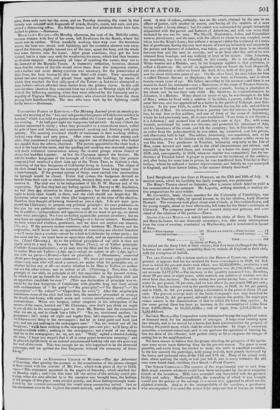COLCHESTER PURITY OF Eaecetoes.—The Morning Journal gives an amusing account
of a meeting of the " free and independent burgesses of Colchester resident in
London," which was held at a public-house called the Crown and Angel, on Tues day evening. "At half-past eight ten burgesses had arrived. At nine o'clock the number amounted to thirty ; when they proceeded to a room above stairs, called for pots of beer and tobacco, and commenced smoking and drinking with great industry. The meeting consisted chiefly of tradesmen in their working clothes, looking very dirty and very grave. After some minutes by-chat among each other, they summoned courage enough to appoint one of themselves, who looked less squalid than the others, chairman. The person appointed to the chair took a stool at the head of the room, and the quaffing and smoking was resumed, together with much collateral conversation among the several groups whom chance or choice had huddled together. At last the Chairman opened the busbies. He told his brother burgesses of the borough of Colchester that they (the present company) had resolved a short time ago at the Three Tuns, to institute a club, consisting of the free burgesses of Colchester living in London. The object of the club should be to prevent the borough of Colchester from being turned into a close borough. If the present system of things were carried into continuation the borough would be closed. Under that system the burgesses derived no benefit from their vote or elective franchise, because they were not called on to exercise it. The club was to be independent of Mr. D. W. Harvey and of the corporation. Not that they had any feeling against Mr. Harvey or Mr. Sanderson,
nor had they objection to these gentlemen • but their elective franchise ought to bring same benefit to them, and the club should not forget that Mr. Sanderson never came to visit them (the burgesses) at the time of the election. Therefore they thought of forming themselves into a club. I do not want (proceeded the Chairman) to propose any political principles for your guidance—to Inns you by any particular opinions—you ought not to tie yourselves by any line of politics—independence and opposition is all we want to get up, no matter tinder what principles. We have no feeling against the present members; but we must have an opposition to them—(Cheering)—it is for our interest. Remember we have wives and children, gentlemen, and we must not neglect our interest. (No, no.) If the present system continues, what between Mr. Harvey and the corporatioin we'll never have an opportunity of exercising our elective franchise —we'll never have a contest—never be asked to Colchester by either party ; but that must not be ; we must have an opposition club, and an opposition candidate too. (Loud Cheering.) As to the political principles of our club it does not signify what tills may be. Ye may be Blues (Tory), or of Yellow principles (Catholic Emancipationists) ; or ye may mix the Blue and the Yellow, or ye may lie neither Blue nor Yellow—(Aye, aye)—adopt no colour at all—(Aye, aye)— stile with no party—(Bravo)—have no principles. e Bravissimo,' answered (ilt the pure burgesses, una voce clamantes.) We must get some opposititm candidate—any man who will stand a contest, no matter what his principles are, or whether lie has any at all—no matter whether he be Blue or Yellow, or neither cue nor the other colour, nor no colour at all. (Cheering.) This, tiles] is the principle of our club, no principle at all ; hut opposition to the present system, by which we get no benefit for our elective franchise. An opposition club and an opposition candidate for ever !' (This nun-declaration of principle was received by the free burgesses of Colchester with plaudits long and loud, mixed with exclamations of " No party"—" No principles"—" No Harvey"—" No corporation"—" No colour"—" Opposition for ever.") After this no-principle foundation-stone of the club had been laid, the members proceeded to arrange the details and forms, with much noise and various interlocutory collisions and contradictions. When one burgess, rather sanguine in his anticipation of the success of the cause, bawled out "Mr. Chairman, now don't you think we ought to put all this in the newspapers, just to show Mr. Harvey and the corporation what we are at, and to check 'ens a little ?" No, no, exclaimed another, 'its premature: let's make all right and reglar first; let's organize a bit, and then we'll have every thing in the newspapers ; but let us keep quiet and hush just now, and not put nothing in the newspapers now." No, no, roared out all the burgesses, r weak have nothing in the newspapers yet—not yet; we'll keep all to ourselves a little while; nothing in the newspapers; not a word of our doings shall be in the newspapers; no, no, not yet.' 'Well,' sighed a shrewd-looking old man, 1 hope you mayn't find it all in some paper to-morrow morning ;' and he glanced significantly at an isolated unconcerned-looking odd sort of a person at the end of the room. This was enough for us, who happened to be the aforesaid personage, and we quitted the free burgesses without the ceremony of leavetiking."


















 Previous page
Previous page